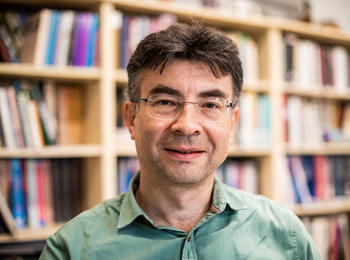Prof. Dr. Yunus Ugur

Friedrich-Meinecke-Institut
Global History
Visiting Scholar (August 2024 - July 2025)
Yunus Ugur participated in the Friedrich-Meinecke-Institut Global History Program as a visiting researcher with the support of The Scientific and Technological Research Council of Turkey (TÜBİTAK).
He completed his BA degree at Boğaziçi University, Department of Sociology, and then received his MA and Ph.D. degrees in the History Department at the same university. He worked at New York Binghamton University in the History Department as a researcher between 2003 and 2004. Then between 2009 and 2020, he was a faculty member of the History Department at Istanbul Sehir University, a director of the Center for Urban Studies and MA Program in Urban Studies. He was in Berlin on sabbatical leave from 2016 to 2017. He is now the director of the Center for Digital Humanities and a faculty member of the History department at Marmara University. In 2024-25, he will continue his studies at Freie Universität-Berlin, Germany.
Ugur has been a chief editor of the Turkish Studies Review (TALID) since 2003, a project leader and among founders of www.digitalottomanstudies.com and www.insidedh.com, a member of the Executive Board of Global Urban History Project (GUHP), and members of the European Association of Urban History (EAUH), International Association for Urban Climate (IAUC), and Middle East Studies Association (MESA). His area of interest covers Ottoman urban history, urban spaces, and neighborhoods, historiography, historical sources, digital history, oral history, historical geography, climate-environmental history, and cultural heritage.
Uğur has written books and articles, directed research projects, and supervised theses on these research areas. In the last five years, he completed a research project, supported by TUBITAK, entitled "Typologies and an Atlas of the Ottoman Cities (1450-1700)" and four different research projects about cultural heritage and tombstones of Istanbul with the support of Istanbul Municipality. Besides, he was an advisor for three projects on the oral and visual history of Istanbul with the support of ISTKA and a member of the editorial board of Great History of Istanbul (10 volumes in TR and EN) supported by Kültür AŞ and ISAM. He finished recently the projects supported by TUBITAK entitled "Mapping the Ottoman Cities: Socio-Spatial Conjunctions and Distinctiveness (1520-1540)" and "A Spatialization of the Nineteenth-Century Istanbul Dervish Lodges: Mapping of their Positions and Networks," and by YTB entitled "The Ottoman Cultural Heritage in Lebanon". His current project is on "Global History of Heating and Cooling: The Case of Classical Istanbul".
Some of the books he contributed as an author and editor are Dijital Beşeri Bilimler ve Osmanlı Çalışmaları, Bir Semte Vefa, Gardens of Eden in Vefa: The Vefa District's Cemeteries (2 v.), Tarih-I Raşidve Zeyli (3 v.), Osmanlı Hukukunda Fetva, The Great History of Istanbul from Ancient Times to the 21st Century (10 v.), Cumhuriyet Döneminde Ümraniye: Şehirleşme, Toplum, Ekonomi ve Yönetim, İstanbul Türbe, Hazire ve Kabirleri: Fatih, Eyüpsultan, Beyoğlu, Fatih (4 v.), Tarih Bilimi ve Metodolojisi, Environment and Urbanism in the Ottoman Empire, Kent Sosyolojisi and Osmanlı'da Şehir, Vakıf ve Sosyal Hayat
Creating a Research Agenda for the Global History of Heating and Cooling: The Cases of Early Modern Istanbul and European Cities (1500-1700)
The long-term aim of this project is to construct a 'connected' and 'global' history or histories of heating and cooling in the urban environment. The aim is to explore the relationship between temperature control (hot or cold) and human habitats, which has had a global impact on various aspects of everyday urban life, both past and present. In order to achieve this goal, it is crucial to identify the primary sources, questions and issues related to the topic, which essentially set the research agenda. The current project focuses on creating a research agenda for the history of heating and cooling in classical/early modern Ottoman Istanbul (1500-1700) and selected European cities.
The first phase of the project focuses on Istanbul. The ongoing study on the history of heating and cooling during the classical period in Istanbul is currently supported by YÖK-ADEP. This second phase aims to evaluate the results of this study and extend its scope to European cities. While some studies have focused on climate and temperature levels in cities, there is very little research on the materials, actors, technologies, economic aspects, administrative structures, architectural characteristics and the relationship between environment and climate in the urban context. By studying Istanbul and selected European cities, the project will pave the way for further research and discussion on the terminologies, issues, questions and sources related to heating and cooling that are relevant to cities worldwide. The methodology of the project incorporates digital humanities and digital history applications with the 'big data' on the topic. These tools will be used to scan primary sources, review relevant literature, define data related to the history of heating and cooling, and classify and analyze them.




